中国中医英文介绍
- 格式:pdf
- 大小:1.69 MB
- 文档页数:4
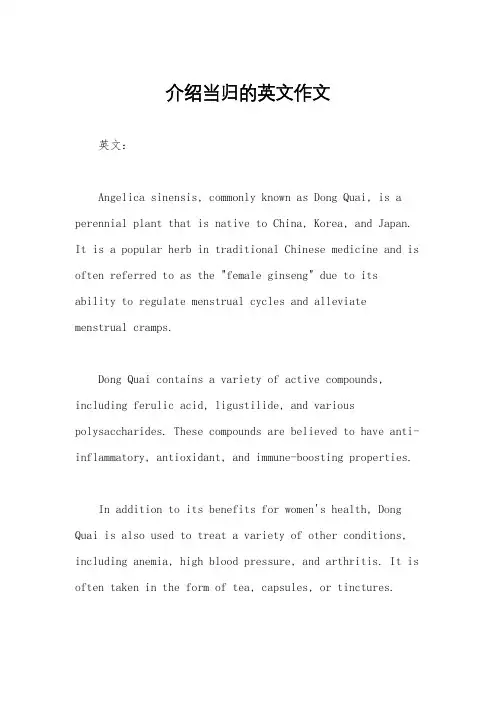
介绍当归的英文作文英文:Angelica sinensis, commonly known as Dong Quai, is a perennial plant that is native to China, Korea, and Japan. It is a popular herb in traditional Chinese medicine and is often referred to as the "female ginseng" due to itsability to regulate menstrual cycles and alleviate menstrual cramps.Dong Quai contains a variety of active compounds, including ferulic acid, ligustilide, and various polysaccharides. These compounds are believed to have anti-inflammatory, antioxidant, and immune-boosting properties.In addition to its benefits for women's health, Dong Quai is also used to treat a variety of other conditions, including anemia, high blood pressure, and arthritis. It is often taken in the form of tea, capsules, or tinctures.Personally, I have found Dong Quai to be very helpfulin regulating my menstrual cycle and reducing menstrual cramps. I often drink it as a tea or take it in capsule form. While the taste of the tea can be a bit bitter, Ifind that adding a bit of honey or lemon helps to make it more palatable.中文:当归,又称女药,是一种多年生草本植物,原产于中国、朝鲜和日本。
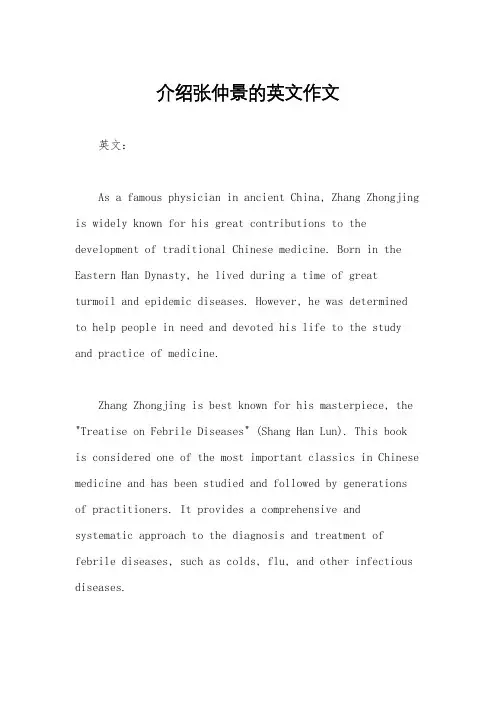
介绍张仲景的英文作文英文:As a famous physician in ancient China, Zhang Zhongjing is widely known for his great contributions to the development of traditional Chinese medicine. Born in the Eastern Han Dynasty, he lived during a time of greatturmoil and epidemic diseases. However, he was determined to help people in need and devoted his life to the study and practice of medicine.Zhang Zhongjing is best known for his masterpiece, the "Treatise on Febrile Diseases" (Shang Han Lun). This bookis considered one of the most important classics in Chinese medicine and has been studied and followed by generations of practitioners. It provides a comprehensive and systematic approach to the diagnosis and treatment of febrile diseases, such as colds, flu, and other infectious diseases.In addition to his medical achievements, ZhangZhongjing was also a moral exemplar. He was known for his kindness, honesty, and humility, and his teachings on medical ethics have had a profound impact on the practiceof Chinese medicine.中文:作为中国古代著名的医学家,张仲景以其对中医发展的巨大贡献而广为人知。
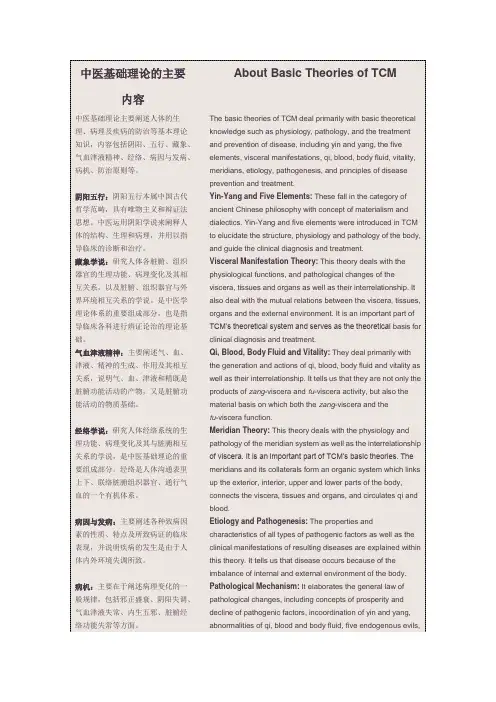
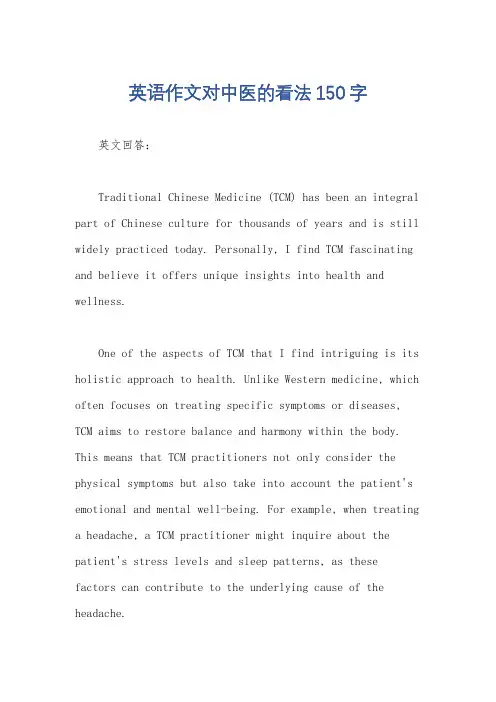
英语作文对中医的看法150字英文回答:Traditional Chinese Medicine (TCM) has been an integral part of Chinese culture for thousands of years and is still widely practiced today. Personally, I find TCM fascinating and believe it offers unique insights into health and wellness.One of the aspects of TCM that I find intriguing is its holistic approach to health. Unlike Western medicine, which often focuses on treating specific symptoms or diseases, TCM aims to restore balance and harmony within the body. This means that TCM practitioners not only consider the physical symptoms but also take into account the patient's emotional and mental well-being. For example, when treating a headache, a TCM practitioner might inquire about the patient's stress levels and sleep patterns, as thesefactors can contribute to the underlying cause of the headache.Another aspect of TCM that I appreciate is its emphasis on prevention. TCM believes in maintaining good health through a balanced lifestyle and proper self-care. This includes practices such as acupuncture, herbal medicine, and dietary therapy. For instance, instead of relying on medication to manage chronic conditions, TCM may suggest dietary changes and lifestyle modifications to address the root cause of the problem. This preventive approach resonates with me as it promotes long-term well-being rather than just temporary relief.Furthermore, TCM's use of natural remedies appeals to me. Many TCM treatments are derived from plants and herbs, which have been used for centuries and have proven therapeutic effects. For example, ginseng is commonly used in TCM to improve energy and vitality, and studies have shown its potential benefits in boosting the immune system and reducing fatigue. I appreciate the idea of using natural substances to support the body's healing processes rather than relying solely on synthetic drugs.中文回答:中医作为中国文化的重要组成部分,已经存在了几千年,并且至今仍然广泛应用。
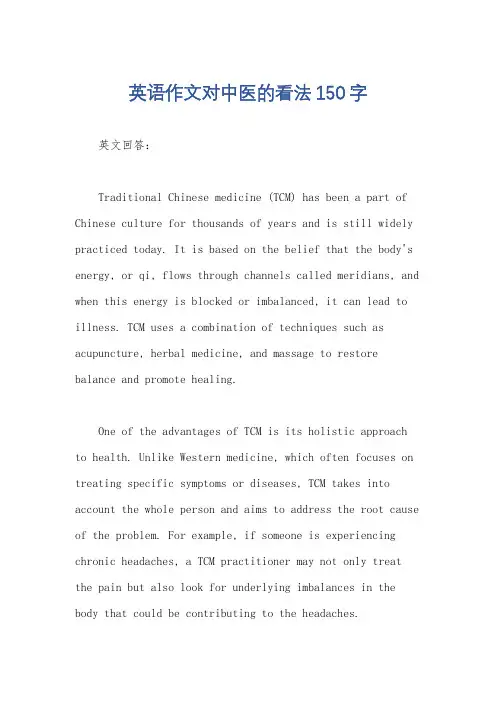
英语作文对中医的看法150字英文回答:Traditional Chinese medicine (TCM) has been a part of Chinese culture for thousands of years and is still widely practiced today. It is based on the belief that the body's energy, or qi, flows through channels called meridians, and when this energy is blocked or imbalanced, it can lead to illness. TCM uses a combination of techniques such as acupuncture, herbal medicine, and massage to restore balance and promote healing.One of the advantages of TCM is its holistic approach to health. Unlike Western medicine, which often focuses on treating specific symptoms or diseases, TCM takes into account the whole person and aims to address the root cause of the problem. For example, if someone is experiencing chronic headaches, a TCM practitioner may not only treat the pain but also look for underlying imbalances in the body that could be contributing to the headaches.Another benefit of TCM is its emphasis on prevention. In TCM, the goal is not just to treat illness but also to maintain overall health and well-being. This can be achieved through practices such as tai chi, qigong, and dietary recommendations. By taking a proactive approach to health, individuals can potentially avoid developingcertain diseases or conditions in the first place.Furthermore, TCM offers a wide range of treatment options. Acupuncture, for example, is a popular TCM technique that involves inserting thin needles intospecific points on the body to stimulate energy flow and promote healing. Herbal medicine is another common TCM practice, with thousands of herbs and formulas available to address various health concerns. Additionally, TCM includes practices such as cupping, moxibustion, and tui na massage, providing a diverse toolkit for practitioners to choose from.In conclusion, TCM offers a unique perspective on health and wellness. Its holistic approach, focus onprevention, and wide range of treatment options make it a valuable complement to Western medicine. By integrating the best of both worlds, individuals can take advantage of the strengths of each system and achieve optimal health.中文回答:中医是中国文化的一部分,已有数千年的历史,并且至今仍广泛应用。
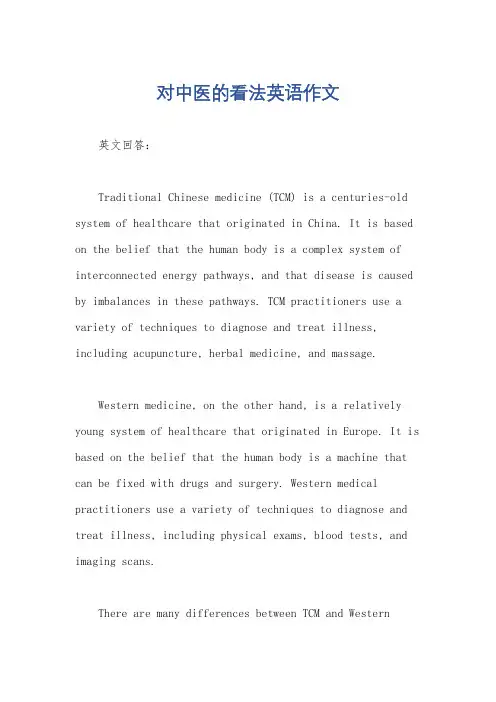
对中医的看法英语作文英文回答:Traditional Chinese medicine (TCM) is a centuries-old system of healthcare that originated in China. It is based on the belief that the human body is a complex system of interconnected energy pathways, and that disease is caused by imbalances in these pathways. TCM practitioners use a variety of techniques to diagnose and treat illness, including acupuncture, herbal medicine, and massage.Western medicine, on the other hand, is a relatively young system of healthcare that originated in Europe. It is based on the belief that the human body is a machine that can be fixed with drugs and surgery. Western medical practitioners use a variety of techniques to diagnose and treat illness, including physical exams, blood tests, and imaging scans.There are many differences between TCM and Westernmedicine. TCM takes a holistic approach to healing, focusing on the whole person rather than just the symptoms of their illness. Western medicine, on the other hand, takes a more reductionist approach, focusing on treating the specific symptoms of an illness.TCM is based on a different understanding of the human body than Western medicine. TCM practitioners believe that the human body is a complex system of interconnected energy pathways, while Western medical practitioners believe that the human body is a machine that can be fixed with drugs and surgery.TCM is often used to treat chronic conditions that are difficult to treat with Western medicine, such as pain, fatigue, and digestive problems. Western medicine is often used to treat acute conditions that require immediate medical attention, such as heart attacks and strokes.There is no one right way to treat illness. TCM and Western medicine are two different systems of healthcare with different strengths and weaknesses. The best approachto treatment is to use the system that is most appropriate for the individual patient and their condition.中文回答:中医是中国千年流传下来的医疗体系。
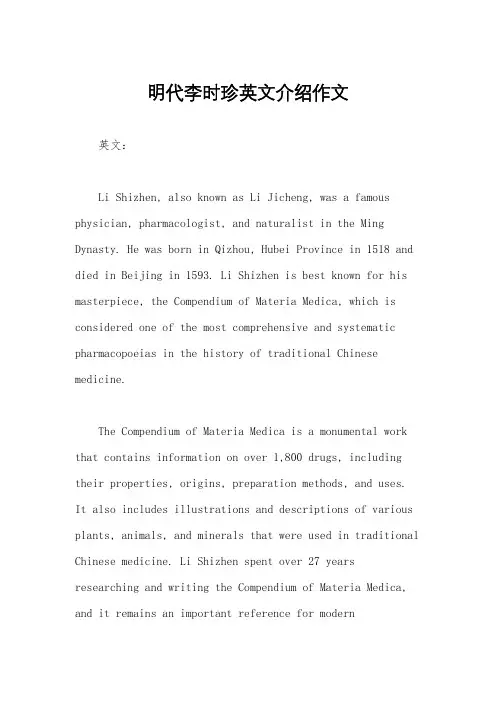
明代李时珍英文介绍作文英文:Li Shizhen, also known as Li Jicheng, was a famous physician, pharmacologist, and naturalist in the Ming Dynasty. He was born in Qizhou, Hubei Province in 1518 and died in Beijing in 1593. Li Shizhen is best known for his masterpiece, the Compendium of Materia Medica, which is considered one of the most comprehensive and systematic pharmacopoeias in the history of traditional Chinese medicine.The Compendium of Materia Medica is a monumental work that contains information on over 1,800 drugs, including their properties, origins, preparation methods, and uses. It also includes illustrations and descriptions of various plants, animals, and minerals that were used in traditional Chinese medicine. Li Shizhen spent over 27 years researching and writing the Compendium of Materia Medica, and it remains an important reference for modernpractitioners of traditional Chinese medicine.In addition to his contributions to medicine, Li Shizhen was also a prolific writer and scholar. He wrote over 30 books on a wide range of topics, including geography, history, and literature. He was also a skilled calligrapher and painter.Li Shizhen's legacy continues to be celebrated in China and around the world. His contributions to traditional Chinese medicine have had a lasting impact on the field, and his Compendium of Materia Medica remains an important reference for practitioners and scholars alike.中文:李时珍,又名李继臣,是明代著名的医学家、药学家和博物学家。
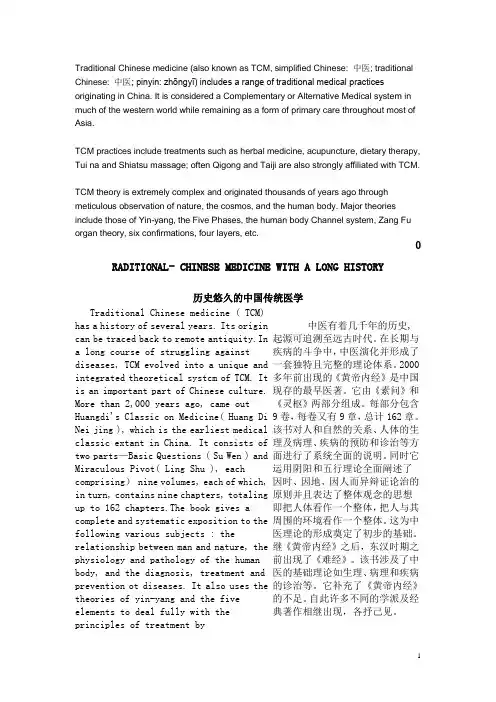
Traditional Chinese medicine (also known as TCM, simplified Chinese: 中医; traditional Chinese: 中医; pinyin: zhōngyī) includes a range of traditional medical practices originating in China. It is considered a Complementary or Alternative Medical system in much of the western world while remaining as a form of primary care throughout most of Asia.TCM practices include treatments such as herbal medicine, acupuncture, dietary therapy, Tui na and Shiatsu massage; often Qigong and Taiji are also strongly affiliated with TCM.TCM theory is extremely complex and originated thousands of years ago through meticulous observation of nature, the cosmos, and the human body. Major theories include those of Yin-yang, the Five Phases, the human body Channel system, Zang Fu organ theory, six confirmations, four layers, etc.0 RADITIONAL- CHINESE MEDICINE WITH A LONG HISTORY历史悠久的中国传统医学Traditional Chinese medicine ( TCM)has a history of several years. Its origin can be traced back to remote antiquity.In a long course of struggling against diseases, TCM evolved into a unique and integrated theoretical systcm of TCM. It is an important part of Chinese culture. More than 2,000 years ago, came out Huangdi's Classic on Medicine( Huang Di Nei jing ), which is the earliest medical classic extant in China. It consists of two parts—Basic Questions ( Su Wen ) and Miraculous Pivot( Ling Shu ), each comprising) nine volumes, each of which, in turn, contains nine chapters, totaling up to 162 chapters.The book gives a complete and systematic exposition to the following various subjects : the relationship between man and nature, the physiology and pathology of the human body, and the diagnosis, treatment and prevention ot diseases. It also uses the theories of yin-yang and the five elements to deal fully with the principles of treatment by 中医有着几千年的历史,起源可追溯至远古时代。
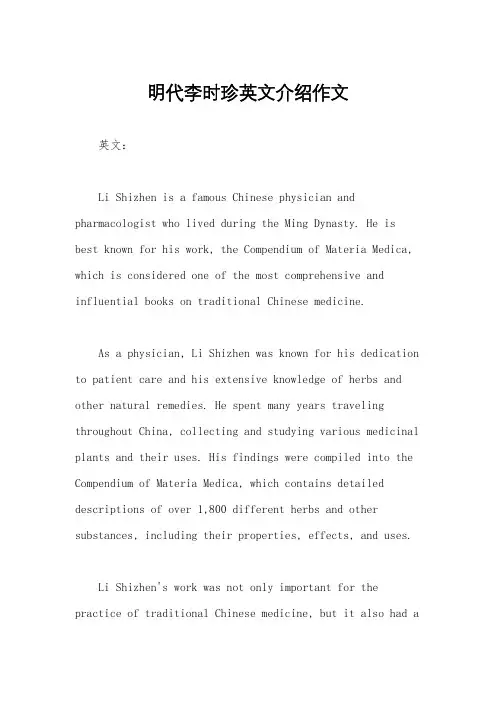
明代李时珍英文介绍作文英文:Li Shizhen is a famous Chinese physician and pharmacologist who lived during the Ming Dynasty. He is best known for his work, the Compendium of Materia Medica, which is considered one of the most comprehensive and influential books on traditional Chinese medicine.As a physician, Li Shizhen was known for his dedication to patient care and his extensive knowledge of herbs and other natural remedies. He spent many years traveling throughout China, collecting and studying various medicinal plants and their uses. His findings were compiled into the Compendium of Materia Medica, which contains detailed descriptions of over 1,800 different herbs and other substances, including their properties, effects, and uses.Li Shizhen's work was not only important for the practice of traditional Chinese medicine, but it also had asignificant impact on the development of modern pharmacology. His detailed descriptions of various substances and their effects were later used by Western scientists in their own studies of pharmacology.中文:李时珍是一位生活在明朝时期的著名中医和药学家。
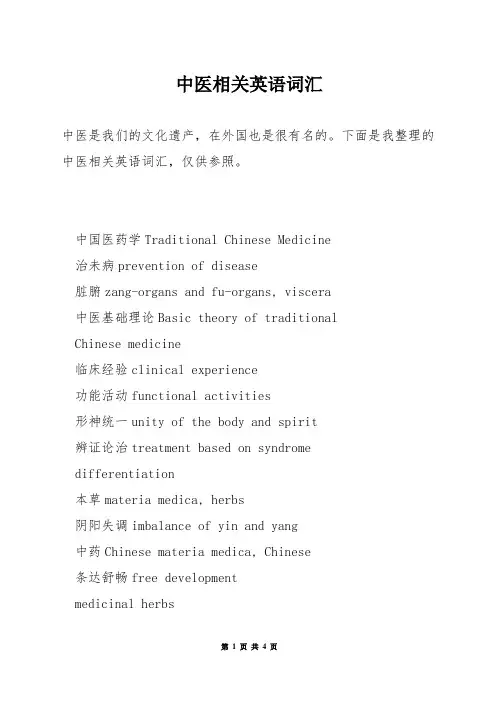
中医相关英语词汇中医是我们的文化遗产,在外国也是很有名的。
下面是我整理的中医相关英语词汇,仅供参照。
中国医药学Traditional Chinese Medicine治未病prevention of disease脏腑zang-organs and fu-organs, viscera中医基础理论Basic theory of traditionalChinese medicine临床经验clinical experience功能活动functional activities形神统一unity of the body and spirit辨证论治treatment based on syndromedifferentiation本草materia medica, herbs阴阳失调imbalance of yin and yang中药Chinese materia medica, Chinese条达舒畅free developmentmedicinal herbs四气五味four properties and five tastes延年益寿prolonging life, promising longevity针灸acupuncture and moxibustion, acumox养生防病cultivating health to prevent disease各家学说theories of different schools正气healthy qi, vital qi汗法diaphoresis, sweating therapy病邪pathogenic factor下法purgative therapy, purgation整体观念concept of holism3中医英语词汇有哪些生理功能physiological functions阳消阴长yang waning and yin waxing 病理变化pathological changes阴胜则阳病predominance of yin leading todisorder of yang临床诊断clinical diagnosis阴胜则阳病an excess of yin leads to deficiency of yang 阳胜生外热exuberance of yang leading to exterior heat 阳胜则热predominance of yang generatingheat阳中求阴obtaining yang from yin寒极生热extreme cold generating heat 绝对偏盛absolute predominance热极生寒extreme heat generating cold 阳虚则寒yang deficiency leading to cold阳损及阴impairment of yang involving yin 阴阳俱损simultaneous consumption of yin andyang阴液不够insufficiency of yin-fluid 阴阳两虚simultaneous deficiency of both yin andyang病机总纲general principle of pathogenesis 阳虚发热fever due to yang deficiency病机pathomechanism, pathologicalmechanism阴阳自和natural harmony between yin and yang 阴阳胜复alternative predominance of yinand yang木乘土the wood over-restrains the earth虚寒证deficiency-cold syndrome 木火刑金wood-fireimpairs the metal扶阳退阴strengthening yang to reduce yin 金水相生generation between the metal andwater祛风散寒expelling/eliminating wind to dispersing cold 生克制化interrelationship between generation and restriction 消导积滞promoting digestion and removingfood retention制则生化restriction ensuring generation。
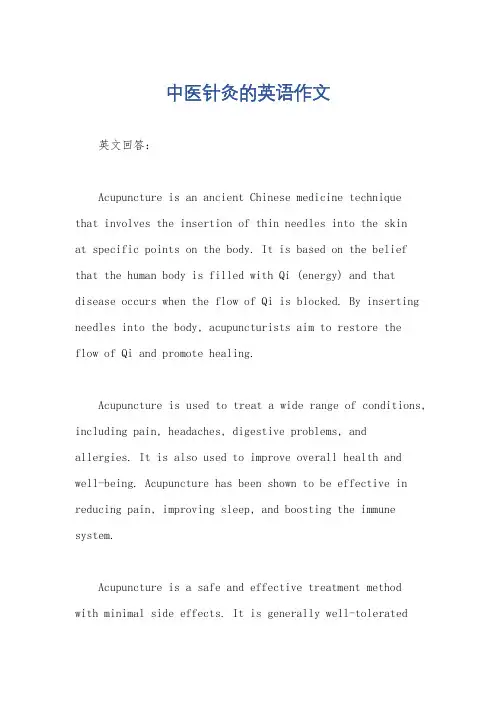
中医针灸的英语作文英文回答:Acupuncture is an ancient Chinese medicine techniquethat involves the insertion of thin needles into the skinat specific points on the body. It is based on the belief that the human body is filled with Qi (energy) and that disease occurs when the flow of Qi is blocked. By inserting needles into the body, acupuncturists aim to restore theflow of Qi and promote healing.Acupuncture is used to treat a wide range of conditions, including pain, headaches, digestive problems, and allergies. It is also used to improve overall health andwell-being. Acupuncture has been shown to be effective in reducing pain, improving sleep, and boosting the immune system.Acupuncture is a safe and effective treatment methodwith minimal side effects. It is generally well-toleratedand most people experience little or no pain during treatment. Acupuncture is typically performed by a licensed acupuncturist who has undergone extensive training.中文回答:什么是针灸?针灸是中国古代医学技术,通过在人体的特定穴位处插入细针来进行治疗。
英文介绍孙思邈的作文高中英文:Sun Simiao, also known as Sun Ssu-miao, was a famous physician and writer from the Tang Dynasty in China. He was born in 581 AD and lived until 682 AD, making him one ofthe longest-lived individuals in Chinese history. SunSimiao is known for his contributions to traditional Chinese medicine, including his famous work, the Qian Jin Yao Fang, which is still studied and used today.Sun Simiao was known for his holistic approach to medicine, which focused on treating the entire person,rather than just the symptoms of their illness. He believed that the key to good health was a balance of mind, body,and spirit, and that this balance could be achieved through a combination of proper diet, exercise, and herbal remedies. Sun Simiao was also known for his emphasis on preventative medicine, encouraging people to take care of their health before they became ill.One of the most famous sayings attributed to Sun Simiao is "The best doctor is the one who prevents sickness." This quote reflects his belief in the importance of preventative medicine, and the idea that a good doctor should not just treat illness, but also work to prevent it from occurringin the first place.中文:孙思邈是中国唐代著名的医师和作家,他出生于581年,去世于682年,是中国历史上寿命最长的人之一。
时珍英语简介带翻译The Introduction of Li Shizhen。
李时珍简介。
Li Shizhen (1518-1593), also known as Dongbi, was a famous physician, pharmacologist, and naturalist in ancient China. He is best known for his masterpiece Compendium of Materia Medica, which is considered the most comprehensive and systematic pharmacopoeia in the history of traditional Chinese medicine.李时珍(1518-1593),又名东璧,是中国古代著名的医学家、药学家和博物学家。
他最著名的作品是《本草纲目》,被认为是中医药史上最全面、系统的药典。
Li Shizhen was born in Qizhou (present-day Qichun County, Hubei Province) during the Ming Dynasty. His father was a local government official, and his family was well-educated and prosperous. Li showed a strong interest inmedicine and natural sciences from a young age and began to study under his uncle Li Yanwen, a famous physician and pharmacologist, at the age of 16.李时珍出生于明朝的蕲州(今湖北省蕲春县)。
1 总论序号汉文名英文名注释中医①traditional Chinese medicine②traditional Chinese physician ①中医学的简称。
②本学科专业职业队伍。
中药Chinese materia medica 在中医理论指导下应用的药物。
包括中药材、中药饮片和中成药等。
中医学traditional Chinese medicine 以中医药理论与实践经验为主体,研究人类生命活动中健康与疾病转化规律及其预防、诊断、治疗、康复和保健的综合性科学。
中药学Chinese materia medica 中药学科的统称。
研究中药基本理论和各种药材饮片、中成药的来源、采制、性能、功效、临床应用等知识的学科。
中医药traditional Chinese medicine and pharmacology 中医与中药的合称。
中医药学traditional Chinese medicine and pharmacology 中医学与中药学的合称,侧重反映中医与中药两者共同发展,密不可分。
中西医结合integration of traditional and western medicine 现代医学等现代科学知识及手段来继承和发展中医药,中西医学相互补充,取长补短,诊治疾病的医学形式。
中医基础理论basic theory of traditional Chinese medic ine 研究和阐明中医学的基本概念、基本理论、基本规律、基本原则的学科。
中医诊断学diagnostics of traditional Chinese medic ine 根据中医学的理论体系,研究诊察病情、判断病种、辨别证候的基础理论、基本知识和基本技能的学科。
方剂学prescriptions of Chinese materia medica 研究治法与方剂配伍规律及其临床运用的学科。
中医内科学internal medicine of traditional Chinese medicine 研究外感温病、内伤杂病等内科疾病诊治与预防的临床中医学。
英语作文模板介绍人物屠呦呦英文回答:Tu Youyou: A Pioneer in Malaria Treatment。
Tu Youyou (1930 present) is a Chinese scientist and pharmacologist who is best known for her discovery of artemisinin, a revolutionary drug that has saved millions of lives from malaria. Her groundbreaking work has made her a pioneer in the field of medicine and has earned her numerous accolades, including the 2015 Nobel Prize in Physiology or Medicine, which she shared with two other scientists.Tu was born in Ningbo, China, in 1930. She showed a passion for science and medicine from a young age and went on to study at Peking University, where she earned a degree in pharmacy. After graduating, she worked at the Academy of Traditional Chinese Medicine in Beijing, where she began her research into traditional Chinese herbal remedies formalaria.In the 1960s, Tu led a team of researchers tasked with finding a cure for malaria, a devastating disease that was ravaging Vietnam and other parts of Southeast Asia during the Vietnam War. Tu and her team screened thousands of traditional Chinese herbal remedies and eventually identified artemisinin as a promising candidate.Artemisinin is a powerful antimalarial drug that is effective against both the asexual and sexual stages of the malaria parasite. It has been credited with reducing malaria deaths by over 50% in some parts of the world. Tu's discovery of artemisinin has revolutionized the treatment of malaria and has made her one of the most celebrated scientists of her time.In addition to her Nobel Prize, Tu has received numerous other awards and honors for her work, including the Albert Lasker Award for Clinical Medical Research, the Wolf Prize in Medicine, and the Grand Medal of the World Health Organization. She is a member of the Chinese Academyof Sciences and the Chinese Academy of Engineering.Tu's discovery of artemisinin has had a profound impact on global health. It has saved millions of lives from malaria and has improved the quality of life for countless others. Tu's work is a testament to the power of science and the importance of traditional medicine.中文回答:屠呦呦,疟疾治疗的先驱。
Chinese Herbal MedicineOther common name(s): traditional Chinese medicine, Chinese herbsDescriptionChinese herbal medicine is a major aspect of traditional Chinese medicine, which focuses on restoring a balance of energy, body, and spirit to maintain health rather than treating a particular disease or medical condition. Herbs are used with the goal of restoring balance by nourishing the body.OverviewBecause of the large number of Chinese herbs used and the different uses recommended by practitioners, it is difficult to comment on Chinese herbal medicine as a whole. There may be some individual herbs or extracts that play a role in the prevention and treatment of cancer and other diseases when combined with conventional treatment. However, more research is needed to determine the effectiveness of these individual substances.How is it promoted for use?Chinese herbal medicine is not based on Western conventional concepts of medical diagnosis and treatment. It treats patients聮main complaints or the patterns of their symptoms rather than the underlying causes. Practitioners attempt to prevent and treat imbalances, such as those caused by cancer and other diseases, with complex combinations of herbs, minerals, and plant extracts.Chinese herbal medicine uses a variety of herbs, in different combinations, to restore balance to the body (see Astragalus, Ginkgo, Ginseng, Green Tea, and Siberian Ginseng). Herbal preparations are said to prevent and treat hormone disturbances, infections, breathing disorders, and a vast number of other ailments and diseases. Some practitioners claim herbs have the power to prevent and treat a variety of cancers. (see Astragalus, Ginkgo, Ginseng, Green Tea, Siberian Ginseng).Most Chinese herbalists do not claim to cure cancer. They use herbal medicine along with conventional treatment prescribed by oncologists, such as radiation therapy and chemotherapy. They claim that herbal remedies can help ease the side effects of conventional cancer therapies, control pain, improve quality of life, strengthen the immune system, and in some cases, stop tumor growth and spread.What does it involve?In China, there are over 3,200 herbs, 300 mineral and animal extracts, and over 400 formulas used. Herbal formulations may consist of 4 to 12 different ingredients, to be taken in the form of teas, powders, pills, tinctures, or syrups.Chinese herbal remedies are made up of one or two herbs that are said to have the greatest effect on major aspects of the problem being treated. The other herbs in the formula treat minor aspects of the problem, direct the formula to specific parts of the body, and help the other herbs work more efficiently.With the increase in popularity of herbal use, many Chinese herbs are sold individually and in formulas. In the United States, Chinese herbs and herbal formulas may be purchased in health food stores, some pharmacies, and from herbal medicine practitioners.Before choosing a mixture of herbs for a patient, the traditional Chinese practitioner will typically ask about symptoms and examine the patient, often focusing on the skin, hair, tongue, eyes,pulses, and voice, in order to detect imbalances in the body.What is the history behind it?Native cultures all over the world have traditionally used herbs to maintain health and treat illnesses. Chinese herbal medicine developed with Chinese culture from tribal roots. By 200 BC, traditional Chinese medicine was firmly established, and by the first century AD, a listing of medicinal herbs and herbal formulations had been developed.The classic Chinese book on medicinal herbs was written during the Ming Dynasty (1152-1578) by Li Shi-Zhen. It listed nearly 2,000 herbs and extracts. By 1990, the latest edition of The Pharmacopoeia of the People's Republic of China listed more than 500 single herbs or extracts and nearly 300 complex formulations.As Western conventional medicine spread to the East, some traditional Chinese medical practices began to be regarded as folklore. However, since 1949, the Chinese government has supported the use of both traditional and Western medicine. Chinese herbal medicine first came to wide-spread attention in the United States in the 1970s, when President Richard Nixon visited China. Today, at least 30 states license practitioners of Oriental medicine and more than 25 colleges of Oriental medicine exist in the United States.What is the evidence?Some herbs and herbal formulations have been evaluated in animal, laboratory, and human studies in both the East and the West with wide-ranging results. Research results vary widely depending on the specific herb, but several have shown activity against cancer cells in laboratory dishes and in some lab animals.There is some evidence from randomized clinical trials that some Chinese herbs may contribute to longer survival rates, reduction of side effects, and lower risk of recurrence for some cancers, especially when combined with conventional treatment. Many of these studies, however, are published in Chinese, and some of them do not list the specific herbs that were tested. Some of these journal articles do not describe how the studies were conducted completely enough to determine whether they use methods comparable to those used in Western clinical research. However, there are some notable exceptions, such as the PC-SPES, a mixture including several Chinese herbs that has been studied in considerable detail in US clinical trials (see PC-SPES).. More controlled research is needed to determine the role of Chinese herbal medicine in cancer treatment and prevention.Are there any possible problems or complications?Because of the variety of herbs used in Chinese herbal medicine, there is a potential for negative interactions with prescribed drugs. Some herbal preparations contain other ingredients which are not always identified. The FDA has issued a statement warning diabetics to avoid several specific brands of Chinese herbal products because they illegally contain the prescription diabetes drugs glyburide and phenformin. FDA warnings have been issued for PC-SPES and production of that product stopped because the Chinese herbal products also contained prescription drugs (indomethicin, diethylstilbestrol and warfarin).Similar concerns have been raised about Chinese herbal products for other diseases, which have been found to contain toxic contaminants and prescription drugs such as diazepam (Valium). Tests of Chinese herbal remedies by the California Department of Health found that nearly one third contained prescription drugs or were contaminated with toxic metals such as mercury, arsenic, and lead. Concerns about Chinese herbal products have been raised in other countries aswell. The Japanese Ministry of Health, Labor, and Welfare reported that some Chinese herbal products contained contaminants which caused severe liver and thyroid problems that were fatal in some cases.Of the more than 5,000 medicinal plant species in China, a small number are potentially toxic (poisonous) to the human body. Toxic herbs may mistakenly be harvested and shipped for herbal medicines and cause harmful reactions in those who take the medicines. In addition, the herbal formulas used are often complex and difficult for manufacturers and practitioners to formulate correctly. For example, an herbal product intended to promote weight loss confused two Chinese herbs with similar names and mistakenly used the wrong one, resulting in severe kidney damage that was fatal in some cases.Although the long history of traditional Chinese herbal medicine is sometimes interpreted as evidence of safety, it is important to note that many of these herbs are no longer produced and used as they were in the past. The historical safety of using low doses of an herb for a short period of time under close supervision of a traditional practitioner does not assure safety when these herbs are used in high doses and concentrated forms over a longer period without medical guidance, not does it address concerns of intentional or inadvertent contamination of these herbs with toxic substances or prescription drugs during the manufacturing process. Practitioners of traditional Chinese medicine licensed by a state board can provide advice on sources of herbs less likely to contain dangerous contaminants. Because some herbs used in traditional Chinese medicine may cause dangerous interactions with conventional medications, patients should talk with their doctor before using any of the herbs.Additional ResourcesMore Information from Your American Cancer SocietyThe following information on complementary and alternative therapies may also be helpful to you. These materials may be ordered from our toll-free number (1-800-ACS-2345).Guidelines for Using Complementary and Alternative MethodsHow to Know What Is Safe: Choosing and Using Dietary SupplementsAmerican Cancer Society Operational Statement on Complementary and Alternative Methods of Cancer Management中草药(中医预防治疗疾病所使用的独特药物)中草药(英文名:Chinese Traditonal drug):中药主要由植物药(根、茎、叶、果)、动物药(内脏、皮、骨、器官等)和矿物药组成。